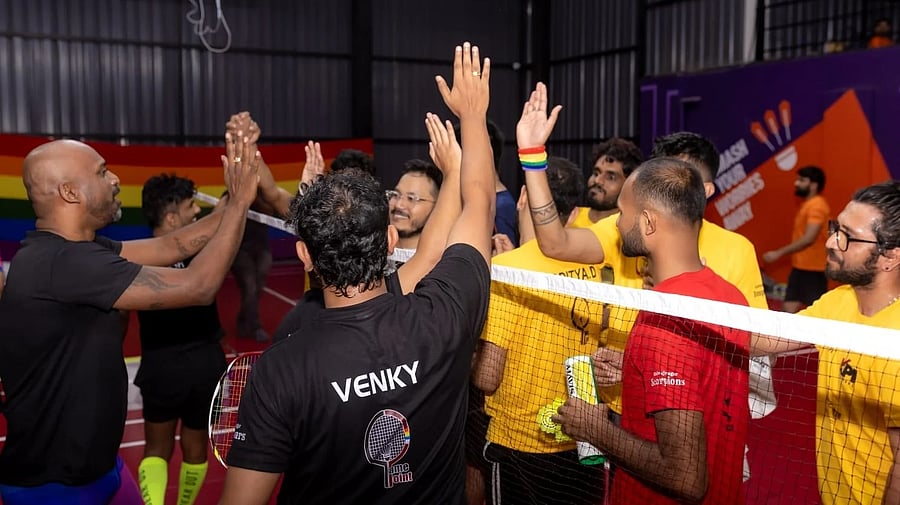
Game Point, a queer badminton community, was founded three years ago.
Credit: Sunil Kumar
Queer sports clubs are creating safe and supportive spaces for the LGBTQIA+ community in Bengaluru. They offer everything from football and cricket to badminton, running, and trekking.
Nithya J Rao, a rehabilitation psychologist with over a decade of experience in queer mental health, calls such spaces “essential”. “They offer psychological safety, affirmation, and belonging in a world that often erases or pathologises queer existence,” she explains.
Nithya says queer people commonly suffer from body dysphoria and sport helps them “see bodies in ways that are not performative, but instead functional”.
The longest-running of Bengaluru’s queer sports spaces is a trekking company called Out and About. It was founded 10 years ago after its founder, Prasenjit Chaudhuri, came out to strangers during a trek.
Now 40, Chaudhuri says this experience made him realise that trekking was a low-stakes space of freedom — where people could “take a break from the closet”.
When the treks started, these felt like a “rebel act”, he says, since homosexuality was illegal in India.
Over 3,000 people have now participated in these weekend treks, which involve transport to the Western Ghats and homestay accommodation. 4-5 times a year they also take 6 day trips to the Himalayas.
People often become very vulnerable and tearful during the experience, says Chaudhuri, because they’ve never experienced such freedom.
He adds that it is “a cool feeling” to watch people who have done the trek go on to lead similar projects of their own.
One such trekker is Ananth, 29, an instructional graphic designer. Ananth is a founding member of a queer cricket community called ‘Cricket Cutlet’, which has over 100 members.
”It’s different people, all mashed together like a cutlet,” Ananth explains.
They book a private cricket turf, so they won’t be bothered.
“A lot of us look butch, so when we played in public people would stare, and sometimes they’d take videos without consent,” says Ananth.
Everyone is welcome except cis-men who “have enough space available for them already”.
Another queer sports community is Bangalore Queer Football, which was started by a few friends in January 2024. The group has 250 members now and its Sunday evening games in Halasuru are regularly attended by 10-15 people.
The group’s co-founder Prakhya says that most mainstream sport teams tend to be homophobic.
“Queer people are desperate for community spaces and belonging,” adds Prakhya, who is a human rights lawyer.
Prakhya says the players have a variety of experience levels, with some starting out as beginners and some playing at national level.
Although the standard of the game has risen hugely since they started, they still try to cater for beginners, says Prakhya.
Prakhya has hope that the world will eventually become more queer and trans friendly, But we are currently seeing a “roll back” of trans representation, Prakhya says, with trans people being legislated out of sports.
Aprameya Madhusudan, spokesperson for queer running club Bengaluru Front Runners, says that when the group started in 2021, the goal was a wholesome and affordable approach towards queer activities.
“Most queer culture and socialising is oriented toward partying and events,” says Madhusudan, 27.
The group, an international chapter of the worldwide Front Runners movement, has nearly 100 members, and runs in Cubbon Park every Sunday. They aim to be an accessible space - the fee is low and members can run or walk depending on their fitness level.
Madhudsan says the club is an excellent place for personal growth. “One guy was 17 when he joined and was fairly apprehensive and discrete about his sexuality" he says. “But a year later he came back and said ‘you guys helped me out and gave me a lot of courage’.”
Queer badminton community Game Point was founded three years ago by a group of friends, including 35-year-old software engineer Sunil Kumar.
Kumar says most of the people in the community had never held a badminton racket before joining. Like him, many had experienced homophobia in school sport environments and internalised that negatively. But learning to play badminton as an adult has changed his perspective. “There was nothing wrong with my ability,” he says.
Game Point prioritises safety and a non-judgemental environment. “Whereas when you play with other groups it becomes less about sport and more about how you behave and if you’re wearing nail paint,” Kumar says.
Queer badminton games are also an opportunity in adulthood to learn the ‘soft skills’ that sport teaches. “Like negotiation, conflict resolution, cheering for winners, uplifting those who are not doing well,” he explains.
The highlight of the collective’s social calendar is the annual Queer Badminton League, which draws teams from across India to complete.
While there is broad agreement among these organisers that these spaces remain necessary, Kumar sums up their shared hope: “The real win will be when we don’t need queer spaces anymore.”
To join, Check @gamepointblr, @bengalurufrontrunners, @out_and_about____, @bangalorequeerfootball on Instagram. For Cricket Cutlet, write to ananth011996@gmail.com